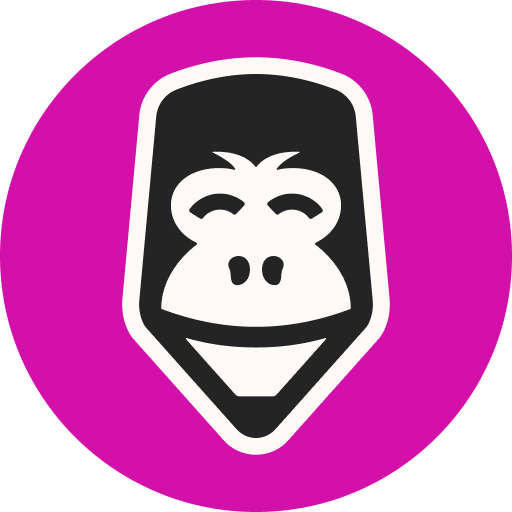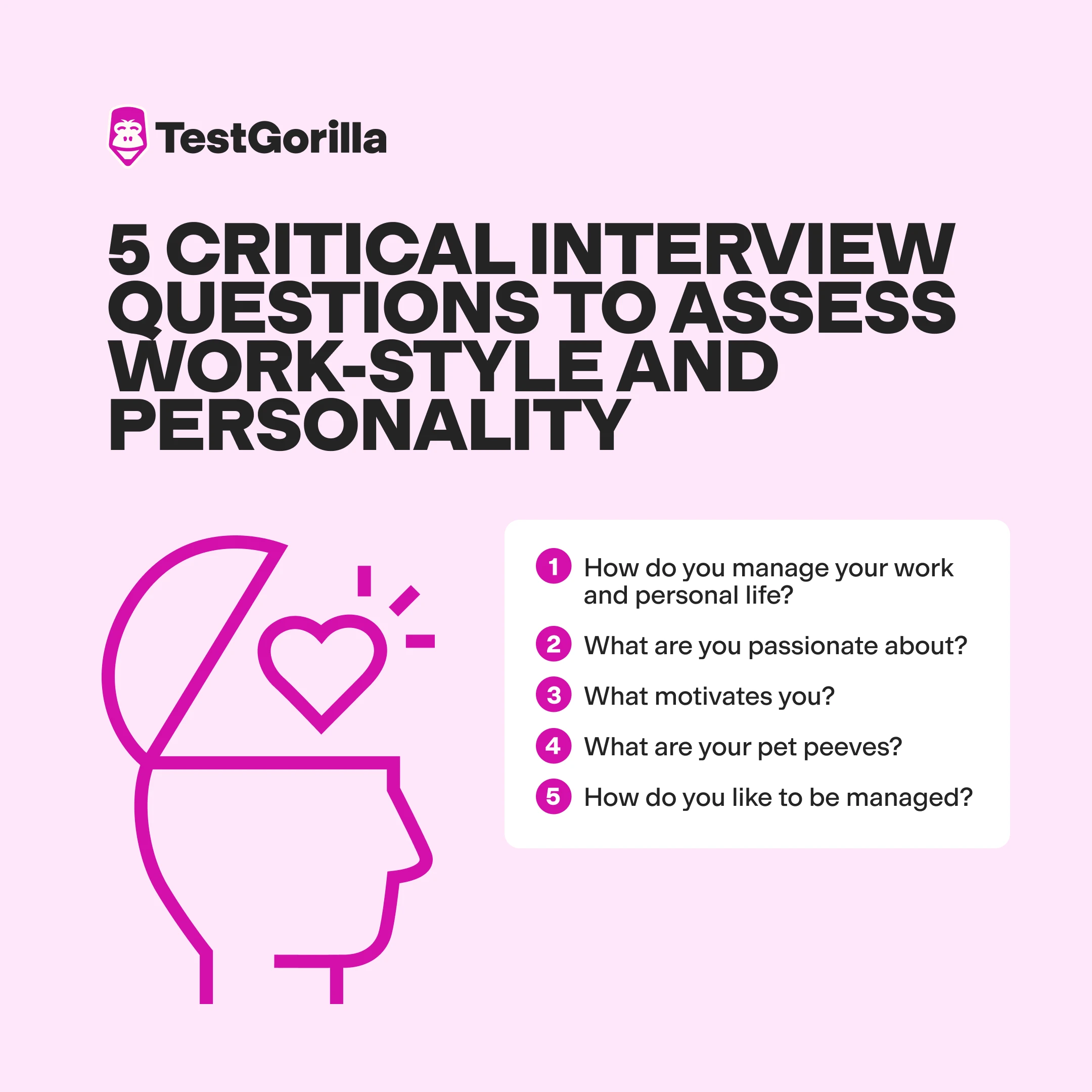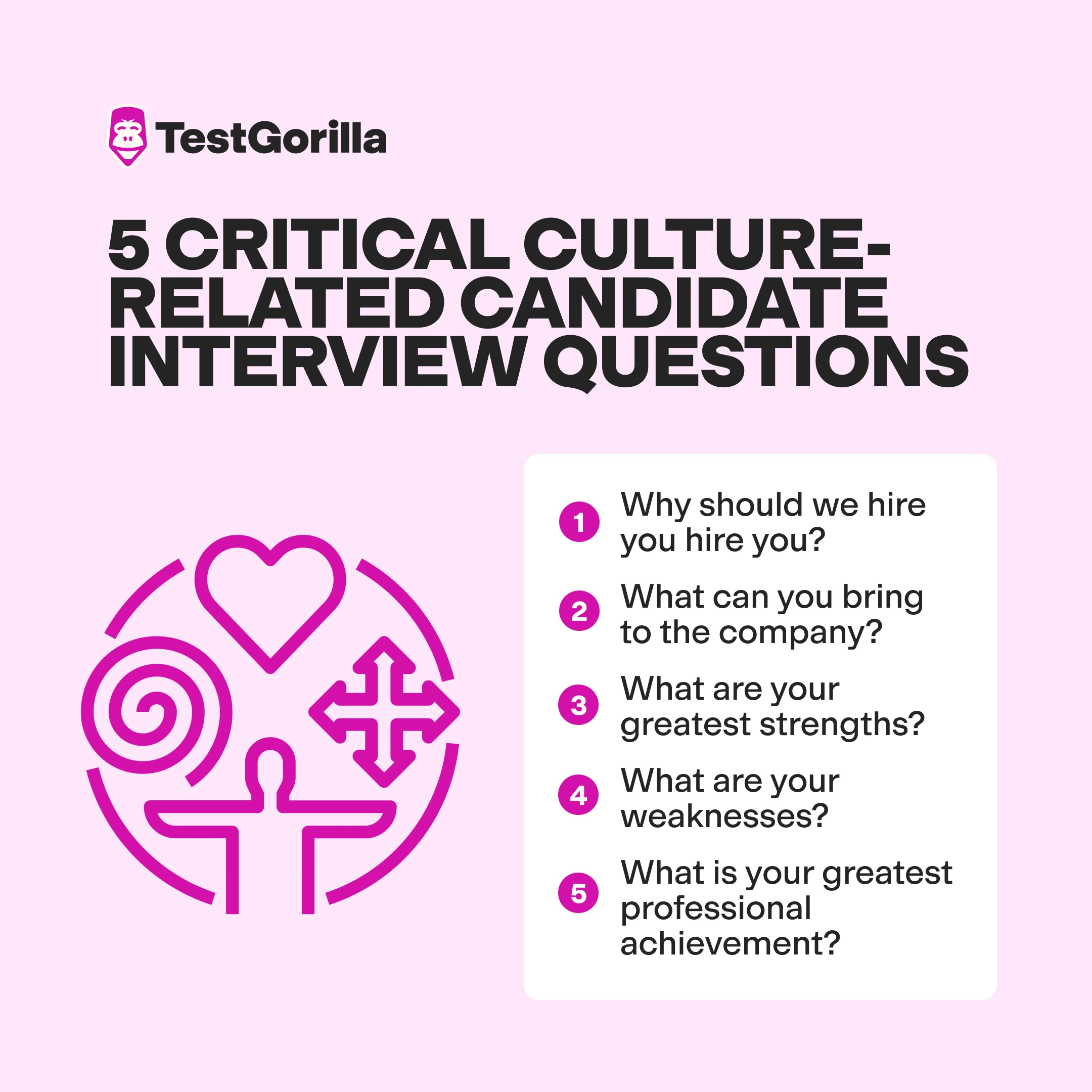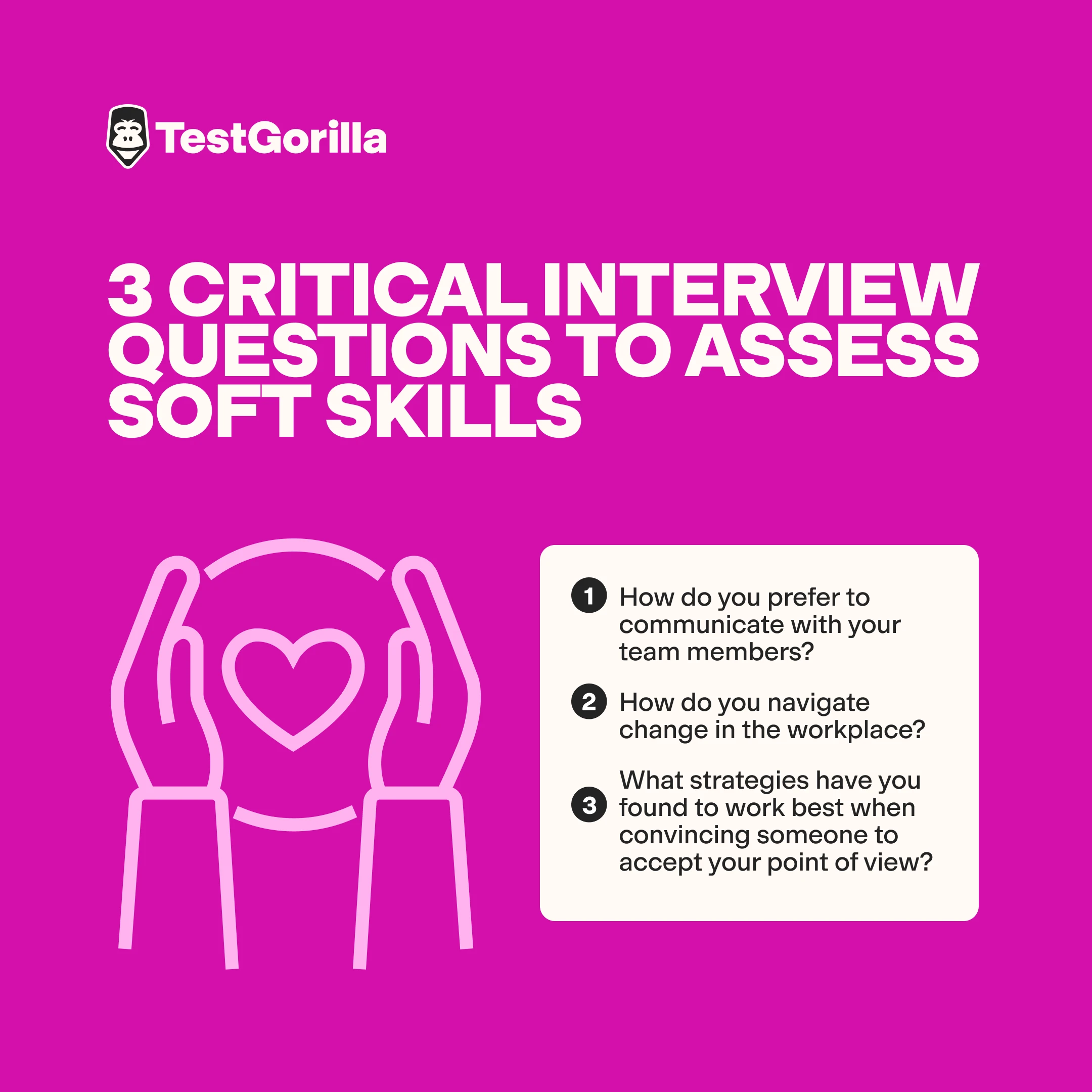75 great questions to ask a potential employee
Invite only the candidates with the best skills to interview.
Looking to interview a potential employee? Though you may already have questions specific to the available role, it’s also important to prepare more generic questions to ask interviewees to get a better feel for your candidates.
We have compiled 75 questions to ask a potential employee for you to use alongside talent assessments.
These questions touch on various topics – from general questions to soft skills – each aimed at bringing out the most useful answers from your applicants.
Table of contents
- 8 general candidate interview questions
- 4 technical skills interview questions to ask an interviewee about skills
- 10 soft skills interview questions
- What not to ask candidates: questions to avoid during interviews
- Inform your candidate interview questions with talent assessment data
- Make the best hires with the right questions to ask potential employees – and our skill tests
- FAQs on interview questions to ask candidates, applicants, and employees
8 general candidate interview questions
There are many different interview questions to ask candidates, depending on the role you’re hiring for. However, no matter what the open position is, you should always ask some general questions like the following:
What skill do you think helped you with your biggest achievement?
Describe a time you disagreed with a decision at work.
Why are you leaving your current job?
Can you explain why you changed career paths?
When can you start?
What do you like least about your current job?
What are you looking for in this position?
What are your salary expectations?
5 critical questions to ask interviewees, plus what to look for in answers
Asking your applicant these five general candidate interview questions can help you get to know them more deeply.
1. Can you tell me more about yourself?
One of the best questions to ask a job candidate in an interview is to determine their suitability for a particular role.
Some candidates may focus heavily on their professional lives. Others delve into themselves as people outside of work, telling you more about their home lives. Look for candidates who have characteristics that align with your organizational values – for instance, volunteering for environmental causes if you have company commitments to sustainability.
2. Can you walk me through your resume?
A potential new hire’s resume should provide you with a basic understanding of their work experience, primary hard and soft skills, and education. This question enables you to go into more detail.
Look for candidates who can explain their skills in depth, particularly how they used them in their previous roles. It’s a prime opportunity to fact-check their resume, although you don’t have time to question every skill.
That’s where skills tests come in particularly useful. Resume evaluation is inefficient and highly prone to bias. To assess candidates’ skills quickly and objectively, you should give them pre-employment skills tests before conducting interviews.
3. How did you find out about this position?
Given that 80% of all job searching is now done online, this is a great question to ask in an interview with a potential employee. It can help you determine where to invest your energy when it comes to advertising positions on job posting platforms.
Asking this is a smooth way to inquire about their motivation for leaving their current role and applying for it.
4. Why do you want to work at this company?
From the career progression that the role might offer to a simple aspect like the location of your office or workplace, there is a wide range of potential answers to this question.
Look for candidates who explain the research they conducted into the job description.
Some candidates may refer to your company values and explain how they align with their own. Conducting research before an interview indicates that your applicant is proactive and understands the role's requirements.
5. Why do you want this job in particular?
Candidates should explain how their skill set gives them the knowledge and abilities to complete this role’s primary duties.
The best answers to this question explain how some of the new skills required for the role fit their career plan.
Stop guessing; start assessing with TestGorilla
11 personality and work-style interview questions
Use the following list of interview questions to ask candidates about their personality traits and work style:
What’s your favorite aspect of your personality?
Do you consider yourself successful?
Where do you see yourself in five years?
How do you plan to achieve your career goals?
What’s your dream job?
What type of work environment do you like most?
What’s your working style?
What’s your management style?
How would you describe your teamwork or collaboration style?
How do you respond to constructive feedback or criticism?
How do you motivate yourself at work?
5 critical personality and work-style questions, plus what to look for in answers
Getting to know candidates as individuals lets you discover if they are a good addition to your company and team. Here are good questions to ask interviewees.
1. How do you manage your work and personal life?
Work-life balance refers to how employees set boundaries between their work and personal lives.
Research shows that maintaining a poor work-life balance by working weekends or while on vacation severely impacts motivation, leading to lower employee satisfaction and quality of work.
It’s one of the best interview questions to ask a candidate because it gives you an excellent chance to discuss your organization’s policies to ensure employees are happy at work.
2. What are you passionate about?
Pursuing passion at work has been shown to increase work performance and engagement.
However, people also have passions outside of work. Knowing what your candidate is passionate about can help you learn more about them as a person and not just as an employee.
For example, bringing on more team members who are passionate about travel and exploration is great if you're a travel company.
3. What motivates you?
Although this may seem similar to the question about candidates’ passions, what motivates someone can differ. Some interviewees may be honest and answer that money is their biggest driver.
Other answers can include the following:
Their family
A comfortable life
Achievements at work
Employees whose motivations align with your organization are more engaged, which leads to a host of benefits, including higher productivity and profitability and lower absenteeism and turnover.
4. What are your pet peeves?
Pet peeves refer to something, usually minor, that irritates someone on some level. Someone’s pet peeves can tell you about the factors that might affect their productivity.
They may refer more to their pet peeves relevant to the office or workplace – for example, a noisy office environment. In these cases, you can ask follow-up questions to see if they can stay productive despite these factors and learn how they work as a team member.
5. How do you like to be managed?
This question can help you learn if your company’s management style matches your candidates’ preferences.
For example, if the candidate talks negatively about a time when they experienced hands-off management and the role requires a lot of independent work, this may be a bad sign.
7 cultural interview questions
Your candidate needs to add to your company culture rather than being a culture fit. These are the top questions to ask an interviewee to learn about the culture add they may offer:
What is the best company culture dynamic?
How important is a good relationship with your manager?
Do you think having a positive working relationship with your colleagues is essential?
How do you deal with disagreements with coworkers or managers?
Which of our organization’s core values do you identify with the most/least?
Tell us about a company culture where you thrived. What did you like about it?
What do you think makes a workplace welcoming and inclusive?
5 critical culture questions, plus what to look for in answers
Not all questions to ask employees at interviews are specific to the role. Asking general questions is a great way to gather knowledge about the candidate’s personality and whether they fit your company culture.
To better understand your applicant, why not use these interview questions alongside TestGorilla’s personality and culture tests?
1. What unique perspectives would you bring to the role?
This question offers insights into the qualities candidates believe they offer based on their experiences, backgrounds, and personalities.
Candidates should focus on the perspectives that make them stand out from others. They should be able to explain clearly how these would benefit the role, their team, and the wider company. Top candidates will provide real-life examples to support their answers.
2. Describe a time when you contributed to building a team member’s sense of belonging.
Candidates’ responses help you explore their empathy skills and their approach to building an inclusive workplace.
Ideally, candidates will be able to explain how they identified that someone was being excluded (or not feeling included), the practical steps they took to help them integrate with the team, and the outcome this led to.
3. Have you ever worked somewhere where your values didn’t align with the organization’s? How did you handle this?
This question requires candidates to explain their own values and reflect on how they managed a conflict. It’s key that candidates demonstrate a level of self-reflection in their answers by identifying the practical steps they took to try and address the situation.
Keep a note of how candidates speak about their former employer. This isn’t an invitation to bad mouth another company – candidates should remain professional when explaining the situation.
4. Which of our company’s values resonate most with you and why?
When responding, candidates should demonstrate that they’ve prepared for the interview and are familiar with your company's values.
Gauge a candidate’s authenticity when answering this question. They should be able to explain exactly why the specific value speaks to them at a professional or personal level and link it to their future contributions to the organization.
5. Can you share an initiative that you’ve led in the past or one you would like to introduce here to improve company culture?
This question specifically asks candidates to explain their ability to add to your culture. It helps explore their problem-solving abilities, initiative, and cultural vision.
Good answers should be specific and tactful. Rather than criticizing your or another company’s culture, candidates should highlight how they saw an opportunity and the practical steps they took to help enhance a company’s culture for everyone.
10 personality interview questions
What’s your greatest accomplishment?
If you could study another subject at a university level, what would it be?
How do you provide yourself with a good work-life balance?
Do you prefer working alone or with a team?
Do you think of yourself as more of a mentee or more of a mentor?
Describe your approach to risk-taking.
Tell me about a time you had to learn something new quickly. What steps did you take?
How do you manage change in the workplace?
How did you handle a previous disagreement with a manager or supervisor?
How do you manage competing deadlines and priorities?
5 critical personality interview questions, plus what to look for in answers
Here are good questions to ask interviewees if you want to learn more about their skills.
1. Why should we hire you?
Asking this question can be a great way to learn more about what your candidate brings to the table.
Ideal answers explain in detail the strengths the candidate offers and why they can be an asset to your business's success.
Prioritize candidates who explain how their skills and knowledge of your market can give you a competitive edge. This knowledge indicates that the candidate has researched your product and services and understands your mission and competitors.
2. What can you bring to the company?
Even though this is similar to the previous question, it’s still good to ask because applicants could give a response that isn’t related to the job role itself.
Focus on candidates who explain how they can benefit your business as an employee. They might refer to a special ability, product idea, or service niche. Perhaps they offer a way to tackle a problem you’re facing.
Candidates who can suggest a specific strategy to benefit their future employer have strong critical thinking skills.
They’re also likely to bring efficient problem-solving skills to the workplace.
3. What are your greatest strengths?
This one is a cliché for a reason: Questioning a candidate on their strengths also reveals other useful information. Do they emphasize skills that might not be useful in the role?
Look for candidates who explain how they wish to build on their strengths in their next role. The best candidates are motivated to develop continually, regardless of their confidence.
4. What are your weaknesses?
Asking about strengths and weaknesses in two separate questions enables the interviewee to provide much more detail and gives you a chance to ask any follow-up questions that may come to mind.
Prioritize candidates who are open and honest about what holds them back. Look out for canned answers like “I’m too much of a perfectionist,” which could indicate that the candidate lacks self-awareness or authenticity.
The best candidates can identify the biggest challenges they face and explain how they plan to improve on their weaknesses in the future.
5. What is your greatest professional achievement?
Emphasizing “professional” achievements can ensure that they describe an accomplishment in their professional development that could benefit them in their new role. Candidates might explain how they ensured their project was successful or what they learned from their experience.
Once they’ve spoken about their greatest professional achievement, you may also want to ask about an achievement they are proud of outside of work.
4 technical skills interview questions to ask an interviewee about skills
Above, we’ve listed common interview questions to ask interviewees about their work and what motivates them. If you’re wondering which interview questions to ask interviewees about their technical, role-specific skills, try these:
What techniques and tools do you use to keep yourself organized?
Tell us about a recent project where you applied [relevant technical skill or tool].
How do you stay up to date with industry trends and technologies?
Explain [technical concept relevant to the role] to me as a layperson.
2 critical technical questions, plus what to look for in answers
Here are good questions to ask interviewees if you want to learn more about their skills.
1. Have you ever had trouble learning a new machine or procedure? How did you deal with it?
Candidates with technical skills must know how to navigate new machines or procedures in your company. These skills benefit software engineering, data science, cloud computing, data analytics, and digital marketing jobs.
However, every job needs candidates who can learn changing procedures and train others who don’t have much knowledge.
2. Do you have [intermediate Microsoft Excel or similar spreadsheet software knowledge?]
Many roles today require candidates to have a basic idea of how to use spreadsheet software when managing their tasks.
For roles where slightly sharper Excel skills are needed, this question helps you spot candidates with intermediate capabilities, like using pivot tables. (If your role doesn’t require these skills, consider including another technical skill and skill level in the brackets, such as “basic knowledge of Mailchimp.”)
Using a Microsoft Excel test to learn more about candidates’ Excel skills, you can make this a more practical question. They can show their ability to create graphs and visualizations, manipulate data in a table, and perform basic calculations on a spreadsheet.
The best insights on HR and recruitment, delivered to your inbox.
Biweekly updates. No spam. Unsubscribe any time.
10 soft skills interview questions
It’s important to include questions that explore candidates’ technical, job-specific skills. However, you should always also include some questions about their soft skills – the more general “human” skills that candidates need, regardless of their role.
How would you describe your people skills?
How would your past coworkers describe your work ethic?
Tell me about a time when you showed initiative or your abilities as a self-starter.
How do you deal with pressure and stressful situations?
Can you tell me about a challenge you’ve faced at work? How did your traits help you handle it?
Can you tell me about a time you showed leadership skills?
Can you tell me about a time you failed?
How do you create strong professional relationships with your coworkers?
Give me an example of when you had to use creativity to solve a problem.
Tell me about a time when you had to manage or respond to change at work.
3 critical soft skills interview questions, plus what to look for in answers
1. How do you prefer to communicate with your team members?
This question can help you determine candidates’ collaboration skills and ability to communicate issues in written and verbal form.
Hiring a candidate who feels comfortable with direct communication is essential if your company relies on in-person conversations when starting new projects.
Send candidates a Communication Skills test to see how they use their active listening skills to communicate effectively with others. Some questions focus on professional etiquette in the workplace.
2. How do you navigate change in the workplace?
An ideal candidate can adapt to sudden changes in your company. Some of these changes may revolve around technological advancements or last-minute decisions from clients. Candidates who find this process challenging may fall behind your team.
Including this in your questions to ask employees at interviews helps you gain insight into their adaptability skills and strategic thinking.
3. What strategies have you found to work best when convincing someone to accept your point of view?
Not everyone agrees in the workplace, especially during brainstorming sessions. Candidates who feel strongly about their ideas should be confident in expressing their thoughts. Sometimes, they might have to convince others to experiment with the idea.
Negotiation requires strong communication skills and a tough mindset, so look out for these qualities when interviewing your job applicants.
Consider using a Negotiation test to make an informed decision about whether candidates can influence conversations and close successful business deals.
What not to ask candidates: questions to avoid during interviews
The questions you ask during an interview should be probative, designed to uncover insights into candidates that help you make final hiring decisions. However, it’s also essential that your questions comply with relevant employment laws – especially those regarding discrimination.
Here are some legal considerations to take into account when designing your interview questions:
Fair chance hiring laws
Fair chance hiring laws prevent or restrict employers from asking candidates about their criminal records. It may mean you can’t ask a candidate about their criminal history until you make a conditional offer of employment or at all.
Anti-discrimination laws
Laws such as Title VII of the Civil Rights Act, the Age Discrimination in Employment Act, and the Americans with Disabilities Act prohibit employers from discriminating against candidates based on protected characteristics, including:
Race
Color
National origin
Age
Disability
Gender
Religion
There are very limited exceptions to this prohibition. For example, under federal law, pilots can’t be employed over the age of 65, so an interviewer could ask to confirm a candidate’s age in this situation.
As a general rule, however, you should avoid asking candidates illegal interview questions related to protected characteristics and other topics (asking about salary may be illegal in your jurisdiction, for instance).
A good way to ensure your interviews are fair is to create a list of questions that directly relate to the job and its duties and ask all candidates the same questions.
Inform your candidate interview questions with talent assessment data
Knowing what questions to ask in an interview to a potential employee can be tricky, but talent assessments make it easier.
Replacing resume screening with skills testing eliminates the need for basic screening questions because you’ve already established these skills during the pre-interview assessment.
For example, when hiring a web developer, you could skip the coding test in the interview by including it in the upfront assessment:
For other positions, you could use skills tests to ensure all interviewees meet a certain standard of critical thinking with general questions like this:
Then, with these assessments already complete, you can use the interview to delve deeper into a job seeker’s competencies and past experiences.
You can also follow up with critical thinking questions more closely tailored to the role or give lower-scoring candidates a second chance to prove themselves.
These tests maximize the efficiency of your interview process, leading to positive outcomes for your workforce.
Research shows that skills-based companies are nearly twice as likely to retain high performers and more than twice as likely to innovate compared with competitors.
Need proof? Check out Ocean Outdoor UK, which shortened the time it spent on interviews by up to five hours per position after switching to TestGorilla – and decreased its rate of unsuccessful hires by 44%.
Make the best hires with the right questions to ask potential employees – and our skill tests
In this article, we’ve shown you:
General job interview questions to ask an employee
The top questions to ask an interviewee to find out about their personality, company culture preferences, and skills
An easy-to-copy list of the best questions to ask candidates
How skills testing can supercharge your interview process
Don’t waste any time. Try a free 30-minute live demo today, and our team at TestGorilla can help you streamline your recruitment process.
Alternatively, jump straight in and create your first multi-measure assessment by signing up for our free forever plan!
FAQs on interview questions to ask candidates, applicants, and employees
Still unsure what questions to ask interviewees so you have all the information you need by the end of the interview? Here are the answers to some common queries.
What are the best 5 interview questions you could ask your candidates?
Can you tell me more about yourself?
Can you walk me through your resume?
How did you find out about this position or job?
Why do you want to work at this company?
Why do you want this job in particular?
What is the most popular interview question?
Why should we hire you?
What can you bring to the company?
What are your greatest strengths?
What are your weaknesses?
Can you tell me more about yourself?
What is your greatest professional achievement?
What is the STAR method when interviewing?
“STAR” stands for “situation, task, action, result” and is the best way for candidates to structure questions about their skills and experiences. HR professionals should look for candidates who can successfully use this method to structure their answers because it shows they understand their achievements and can communicate them.
How do I close an interview?
“Thank you for taking the time to talk to us today. We’ll be in touch with a hiring decision before the end of the week.”
“Thank you for speaking with us today. We’d like to invite you to the next stage, which is a written test followed by a second interview next week. Please let us know your availability by the end of the day tomorrow.”
You've scrolled this far
Why not try TestGorilla for free, and see what happens when you put skills first.





















